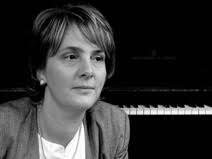Beatrice Campodonico was born in Milan in 1958 and graduated in composition and choral singing with Vittorio Fellegara, later perfecting herself with Mino Bordignon for choral conducting, with Boris Porena, Ada Gentile and Franco Donatoni for composition and Angelo Paccagnini for electronic music. Alongside her work as a composer, she also works as a choir director, as a promoter of contemporary music and as a teacher. Her music has been performed at important events in Italy and abroad. Since 2000 she has participated as a speaker in conferences and seminars, many of which aimed at valorising and disseminating the music of contemporary female composers with particular attention to Italian female composers. From 2000 to 2011 she was the promoter of the “In-audita” musica project at the G. Cantelli Conservatory of Novara (IT). As a performer she directed the “Harmoniae Mundi” Vocal Group. She is currently a teacher at the Milan Conservatory.
BEATRICE CAMPODONICO AND THE GUITAR
Beatrice Campodonico’s style is located in that frontier land that seeks to reconcile communication with the audience and the most advanced compositional research: this balance is happily achieved in „La Leggenda di Vassilissa“ (ed. Rugginenti), written in 1998 and dedicated to Maria Vittoria Jedlowski (1956) who oversaw the revision.
This is the second work for solo guitar, after the „Three short pieces“ and was born from the collaboration and friendship with Maria Vittoria Jedlowski who suggested adapting the fairy tale of Vassilissa to music for a guitar and dance project. The piece, divided into five scenes and an intermezzo, is inspired by the Russian fairy tale of the same name which sees Vassilissa as the protagonist, a poor orphan represented by a theme harmonized in fourths, forced by her wicked stepsisters and her stepmother to face the terrible witch Baba Yaga, with the false pretext of searching for a house fire. Vassilissa will return home triumphant, after having experienced frightening situations, always guided by the feminine intuition inherited from her sweet mother.
Characteristics of this work are the richness of the timbral palette and the series of chordal successions that the composer uses to develop complex and variously articulated rhythmic cells. Complexity and rhythmic irregularity are chosen as a vehicle for feelings of restlessness, anxiety and fear. Only the last song „The triumph of Vassilissa“ is linear and soft, underlining a particular way of experiencing victory: in fact, one does not always shout with joy once a goal has been reached or a difficulty has been overcome; most of the time a sweet and melancholic tiredness absorbs the body and the mind. “La Leggenda di Vassilissa” was awarded a diploma of merit at the III “Paolo Barsacchi” international guitar composition competition.
In her first cd “Ladies of the six strings” (Da Vinci Publishing), Emma Baiguera (1999) decided to adapt the text of the fairy tale in order to play it while performing the piece.
GUITAR COMPOSITIONS (SOLO AND CHAMBER MUSIC)
“Tre pezzi brevi” (1992)
for guitar
“Echos” (1993)
for flute, clarinet, and guitar
“La Leggenda di Vassilissa” (1998)
for guitar
“Canzone d’autunno” (2000)
for flute in C and flute in G and guitar
“Dialogue Angelique” (2001)
for 2 guitars
“For two” (2001)
for 2 guitars
“Free Islands” (2004)
for guitar
“Odo Risonanze Indefinite” (2006)
for flute and guitar
Many thanks to the guitarist Emma Baiguera for writing this article for gitarre-gendern. Emma Baiguera has just recorded an album with works by female composers, which will be linked here as soon as it is released.
